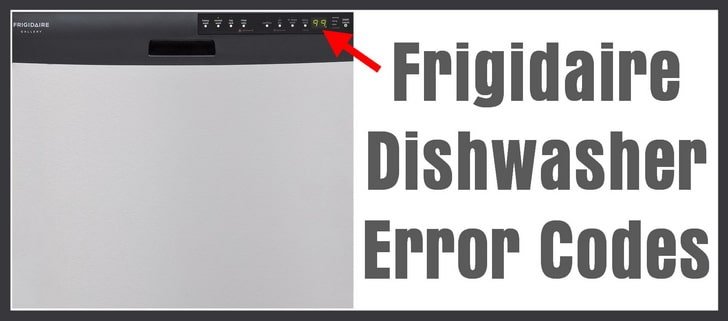
Imagine your dishwasher as a mini-wash cycle party organizer. It’s got a checklist: water in, heat up, clean, rinse, and dry. The F1 code is like a stop sign somewhere in that checklist, often when the heating system isn’t playing ball. Don’t let this freak you out, though! Understanding what triggers this error and how to prevent it is easier than you might think.
Understanding the Frigidaire Dishwasher Error Code F1
To keep your dishwasher running smoothly, it’s crucial to understand why the error code F1 appears in the first place. The F1 error is predominantly related to the water heating system, indicating issues with the dishwasher’s ability to properly heat the water. Imagine trying to wash dishes with cold water; it’s not as effective, right? Similarly, your dishwasher needs hot water to clean those greasy pots effectively.
The F1 error can stem from a malfunctioning heating element or a glitchy thermostat. Think of the heating element as the “stove” of your dishwasher. If it doesn’t heat up correctly, your dishwasher can’t do its job. Sometimes, the thermostat, which acts as the temperature monitor, might not send the correct signals, leading to error codes.
Another reason could be a faulty control board. This board is like the brain of your dishwasher, controlling all the functions. If it gets confused or damaged, it might misinterpret other operational signals, erroneously triggering the F1 code. Knowing these potential causes helps you take appropriate steps to fix or prevent them.
Regular Maintenance: Key to Prevention
Just like a car needs regular oil changes, your dishwasher benefits from periodic maintenance. By dedicating a little time to upkeep, you could save yourself from a future filled with error codes and dirty dishes. Here’s the deal: when you do regular checks, you’re proactively nipping potential problems in the bud.
Start with the heating element. Make sure it’s free from any residue or buildup. Residue can insulate the element, preventing it from heating properly. Regularly clean around it and ensure there’s no debris or scale that might affect its performance. You might consider using a dishwasher cleaner — it’s like a spa day for your machine, keeping all components fresh and functional.
Additionally, give the thermostat and control board a periodic check-up. Ensure connections are tight and free from corrosion, which can cause communication breakdowns within your dishwasher. If you’re unsure how to do this, consulting your dishwasher’s manual or calling in a professional can be a wise move. Routine maintenance not only helps prevent the F1 error but also extends your appliance’s lifespan.
Potential Consequences of Ignoring Error Code F1
You might be tempted to ignore an F1 error and hope it resolves on its own, but doing so can lead to bigger issues. It’s a bit like ignoring a small leak in your roof — eventually, it’s going to cause significant damage. When you consistently run your dishwasher with an unresolved F1 error, you risk damaging internal components further.
For starters, the continuous strain on the heating element might lead it to fail entirely. Repairing or replacing this component can be costly and time-consuming. Moreover, unresolved heating issues can lead to mold growth due to unclean, damp environments, unhealthy for both your dishes and your family.
Additionally, ignoring this error could eventually compromise your dishwasher’s entire control board, akin to a car’s engine failure. This would result in the appliance being non-operational, requiring full replacement. The good news? By addressing the F1 error promptly, you avoid these pitfalls and ensure a smoothly running machine.
Steps to Take if the Error Code F1 Pops Up
So, error code F1 has appeared on your dishwasher’s display. What should you do first? It’s like getting a flat tire; your immediate action should be troubleshooting. Begin by resetting the machine. This process is much like rebooting a computer — it can resolve temporary glitches. Unplug the dishwasher or turn off the circuit breaker, wait for about five minutes, then restart it.
If the error persists, inspect the heating element for any visible signs of damage or residue buildup. Remember, it’s like checking for clogs in a drain. If you’re comfortable, test the thermostat and heater with a multimeter to ensure they have continuity. No reading? They might be bad and need replacing.
Should these steps not resolve the issue, it may be time to call in a professional. A licensed technician can diagnose complex problems and provide solutions that are out of reach for most beginners. Always use this step as a last resort after attempting simpler checks and fixes.
Preventative Tips for the Future
To keep that F1 error at bay, adopting a few preventative measures can make all the difference. It’s much like adopting healthy habits to avoid future doctor visits. First, incorporate a cleaning schedule into your routine. Use a dedicated dishwasher cleaner monthly to prevent residue and scale buildup, which can affect heating elements.
Additionally, be mindful of how you load the dishwasher. Avoid overloading, which can affect water circulation and heating efficiency. Think of it as giving your dishwasher some breathing space to do its job right. Opt for high-quality detergent that helps maintain internal cleanliness and doesn’t leave behind residue.
Lastly, inspect the seals and connections regularly — they’re like the nuts and bolts that hold everything together. Ensure they’re tight and clean, preventing any possible water leaks or electrical issues. By embracing these small, consistent habits, you’re not just warding off future errors; you’re ensuring your dishwasher runs smoothly for years to come.